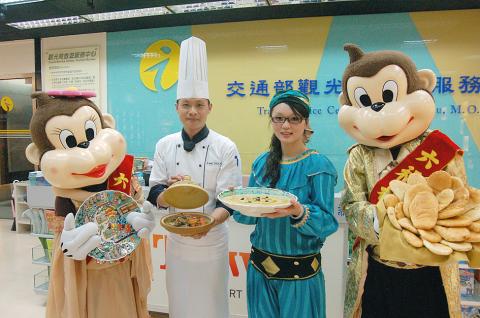The Tourism Bureau yesterday said it aimed to have 50 restaurants certified as Muslim-friendly as it looks at options to further tap into the Muslim tourist market.
Eric Lin (林坤源), director of the bureau’s international travel division, said Muslim tourists visiting Taiwan mainly come from Malaysia, Indonesia, Singapore, Brunei and northwest China.
The bureau hopes to see 10 percent growth in tourist arrivals from each of those countries this year, Lin said.

Photo: Tseng Hung-ju, Taipei Times
The frequency of broadcasts of television commercials on traveling in Taiwan in Malaysia has increased, he said, adding that the bureau has also worked with travel agencies to organize tours.
“The nation drew about 6 million tourists last year,” Lin said. “The population of Muslim countries is approximately 1.7 billion, which presents a high potential for international visitors.”
The “Muslim-Friendly Restaurant” certification was handled by the Chinese Muslim Association.
Association secretary-general Salahuddin Ma Chao-yen (馬超彥) said the main purpose of the certification was to let Muslims around the world know that there are Muslims in Taiwan as well.
Based on the certification guidelines, restaurants must ensure that the food offered to Muslims is prepared according to Islamic law. The guidelines also have specific instructions for various items, ranging from buying from certified halal food suppliers and seasonings to cookware.
The service personnel must also receive training on the “dos and don’ts” of hosting according to Muslim customs.
Eleven restaurants nationwide have already been certified as Muslim-only businesses — which serve only halal food — while there are seven Muslim-friendly eateries — businesses that serve both halal and non-halal food.
Restaurants in some amusement parks, such as Leofoo Village Theme Park in Hsinchu County, are among those that have been certified.
Jozo Chen (陳怡穎), marketing specialist at Shangrila Leisure Farm in Yilan County, said the farm hosted about 1,000 Muslim tourists last year.
“Apart from the food, they [Muslim tourists] also require a separate dining area to eat,” Chen said. “We must also have arrow signs [pointing to Mecca] for their daily prayers and proper washing facilities in the hotel rooms.”
Chen said the cost of hosting Muslims is slightly higher than that of non-Muslim tourists, but the certification would help the hotel attract more tourists from Muslim nations.

Alain Robert, known as the "French Spider-Man," praised Alex Honnold as exceptionally well-prepared after the US climber completed a free solo ascent of Taipei 101 yesterday. Robert said Honnold's ascent of the 508m-tall skyscraper in just more than one-and-a-half hours without using safety ropes or equipment was a remarkable achievement. "This is my life," he said in an interview conducted in French, adding that he liked the feeling of being "on the edge of danger." The 63-year-old Frenchman climbed Taipei 101 using ropes in December 2004, taking about four hours to reach the top. On a one-to-10 scale of difficulty, Robert said Taipei 101

Taiwanese and US defense groups are collaborating to introduce deployable, semi-autonomous manufacturing systems for drones and components in a boost to the nation’s supply chain resilience. Taiwan’s G-Tech Optroelectronics Corp subsidiary GTOC and the US’ Aerkomm Inc on Friday announced an agreement with fellow US-based Firestorm Lab to adopt the latter’s xCell, a technology featuring 3D printers fitted in 6.1m container units. The systems enable aerial platforms and parts to be produced in high volumes from dispersed nodes capable of rapid redeployment, to minimize the risk of enemy strikes and to meet field requirements, they said. Firestorm chief technology officer Ian Muceus said

MORE FALL: An investigation into one of Xi’s key cronies, part of a broader ‘anti-corruption’ drive, indicates that he might have a deep distrust in the military, an expert said China’s latest military purge underscores systemic risks in its shift from collective leadership to sole rule under Chinese President Xi Jinping (習近平), and could disrupt its chain of command and military capabilities, a national security official said yesterday. If decisionmaking within the Chinese Communist Party has become “irrational” under one-man rule, the Taiwan Strait and the regional situation must be approached with extreme caution, given unforeseen risks, they added. The anonymous official made the remarks as China’s Central Military Commission Vice Chairman Zhang Youxia (張又俠) and Joint Staff Department Chief of Staff Liu Zhenli (劉振立) were reportedly being investigated for suspected “serious

Nipah virus infection is to be officially listed as a category 5 notifiable infectious disease in Taiwan in March, while clinical treatment guidelines are being formulated, the Centers for Disease Control (CDC) said yesterday. With Nipah infections being reported in other countries and considering its relatively high fatality rate, the centers on Jan. 16 announced that it would be listed as a notifiable infectious disease to bolster the nation’s systematic early warning system and increase public awareness, the CDC said. Bangladesh reported four fatal cases last year in separate districts, with three linked to raw date palm sap consumption, CDC Epidemic Intelligence